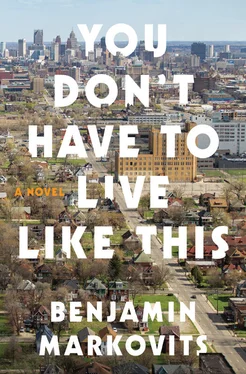“What is this rating, like a sex appeal thing?” I asked him once.
Steve tried to persuade me it was more innocent than that. “It’s more like, do they show up on time, can they keep up their end of a conversation, are they clean? Do they spend all their time checking their phones?”
“You check your phone constantly.”
“That’s because you’re a real friend,” he said. “I would never behave that way with a virtual friend. It kills your rating.”
“Well, where do I get to rate you?”
“You only get to rate me if you respond to one of my posts. But you never would. You’re a Luddite.”
The truth is, my real life was filling out nicely, I didn’t need a virtual one. I hung out with Walter and Susie, and babysat for Tony and sometimes looked after Clarence for a quarter hour in the afternoon. I wrote the newsletter, which got me out of the house and introduced me to people. Sometimes I had dinner with Robert and Bill, at fancy restaurants or at Robert’s house with the whole thing catered for. Ridiculously pretty women in black skirts and white shirts handed around trays of champagne as soon as you walked in the door. About once a month, or maybe a little less than that, I met up with Tony’s friend Mel Hauser, and we drove out to the police canteen and had lunch there and fired off some rounds. Mel persuaded me to buy a handgun; he said the Remington wasn’t much use for anything but a drive-by shooting. If you wanted to protect yourself you needed a hand weapon, and he offered to get me one through the department. Retiring officers had the option of buying their weapons from the city, which most of them took, but some of them didn’t, and then the guns became generally available for purchase by other officers. Mel bought me one of these, a Smith & Wesson M&P40 with a four-and-a-quarter-inch barrel.
Astrid and I met up irregularly but often stayed the night together, then saw each other several days running, buying groceries, cooking dinner, watching movies, living like lovers. We could also go weeks at a stretch without so much as texting. Nolan and I sometimes went jogging through the neighborhood streets. Some of his football muscle had turned to fat since he quit playing and he wanted to lose the weight. Once or twice a month, on Sunday morning, Robert picked me up on the way and we drove out to Belle Isle for a five-mile run. Tony and Cris had me around to their house for dinner, which saved them the cost of getting a babysitter. I saw Eddie Blyleven, Kurt Stangel, Jayson Mogford and Don Adler at Neighborhood Watch meetings, and I also sometimes went out on patrol with Eddie and Kurt. Kurt had started to get somewhere in the extras business. This gave him something to talk about — Sean Penn bummed a cigarette off him once, that kind of thing.
Steve Zipp had nicknames for a lot of us. Eddie Blyleven he called Insurance Eddie or Captain Eddie, because he was big and fair-haired and all-American and like everybody’s big brother. He put his hand on your shoulder, he said encouraging general things, he called you buddy. In fact, he used to be a lieutenant in the Air Force Reserve and even did a tour of Afghanistan before being discharged for medical reasons. His life had fallen apart, he was drinking too much, his wife was in the middle of an affair. They eventually divorced and she remarried. Then Eddie sobered up and needed somewhere to start again so he came to Detroit. Some of these things he told me himself, without making judgments or excuses, and the truth is, when I knew him, he seemed like such a controlled likable guy that nothing he said about this past self seemed very relevant or revealing.
Sometimes we all hung out together, Eddie and Kurt and Steve and me, and Walter, too, before Susie arrived. We went fishing at the Roostertail together. Eddie and Kurt both liked to fish, and for their sake we got up at five on a summer morning and drank our coffee in the car. Steve called Kurt Stangel “the Strangler,” for no good reason, apart from the name, I guess, and the fact that he was big in a different way — flat-faced and strong and kind of affectless, too. As it happens, Kurt did a great Orson Welles impersonation, with the almost-English accent and the slyness and the suppressed grin. Fishing involves a lot of time-passing techniques. But he could be pretty passive, too. I got the sense from Kurt that what used to be his personality (you know, funny and referential — he knew a lot of movies), which he could roll out effortlessly in high school and college, now took some effort. Because of parenthood and adulthood or whatever. So you only got glimpses of it. Kurt called Steve Zipp Big Thumb, like it was his Indian name or something, because of that damn phone. I don’t know what they called me.
For some reason Beatrice had dropped off the map. I saw her at Robert’s house but that was it. And maybe once or twice every couple of weeks, I substituted at Kettridge High and had lunch in the school cafeteria with Gloria Lambert.
The first day I got called in was early October, very cold and rainy, real Monday-morning-blues weather. Reception smelled of wet clothes and too many kids. Nobody cared what my background was in, they just gave me a textbook and the attendance card and sent me out to teach. By “they” I mean the assistant principal, Mrs. Sanchez.
“We’re starting you off nice and easy,” she said. “Ninth-grade math. Fractions.”
I said, “I haven’t thought about fractions in twenty years.”
Mrs. Sanchez had long, artificial, brightly painted nails. Her office was full of spider plants. One window looked into the reception area, the other had a view of a corridor. She had her degrees on the wall, from Wayne State and Marygrove College, alongside photographs of kids — Mrs. Sanchez sometimes had her arm around them. The tube lighting on the ceiling cast no shadows, it seemed designed to grow the plants. You couldn’t see any outside weather, and the office felt warm from all the lights.
She said, “I wouldn’t worry overmuch about fractions.”
When I got to the classroom, a few minutes before the bell, the door was open and kids were not only coming in but going out, too, talking in the hall, visiting —for some reason, all kinds of spinsterish words like that came into my head. Then the bell went off, as loud as a fire alarm, and I stuck my neck out into the hall and said, “Everybody get in who’s coming in.”
It was a relief to say something out loud. I was talking so much in my own head, talking to myself and looking at everything and feeling blank and tired. A few kids came in and I shut the door. Then about ten seconds later another kid walked in, and I said, “Okay, that’s it, you’re the last one,” and stood by the door with my back against it. Then someone else tried to get in.
“Hey, what the fuck,” came a voice on the other side of the door. Some of the kids in the classroom heard him and laughed.
One of them called out, “Hey, Nugent, you late. It’s a lockout.”
“What do you mean, it’s a lockout?”
While this was going on, I stood there, pressing my back against the door and not saying anything.
“Sub’s here and he’s locking you out.”
Then Nugent said, “What’s he like?”
The kid talking to him had an Eagles jersey on, which was meant to be short-sleeved but came over his elbows on the arms and hung around his chair like a dress.
“Harry Potter,” the kid said.
“All right, keep it down.”
“You gonna let me in?”
“I saw you in the hall. I said, everybody get in who’s coming in. You didn’t come in.”
“I had something to do.”
“You were eating a candy bar,” I said.
Читать дальше












